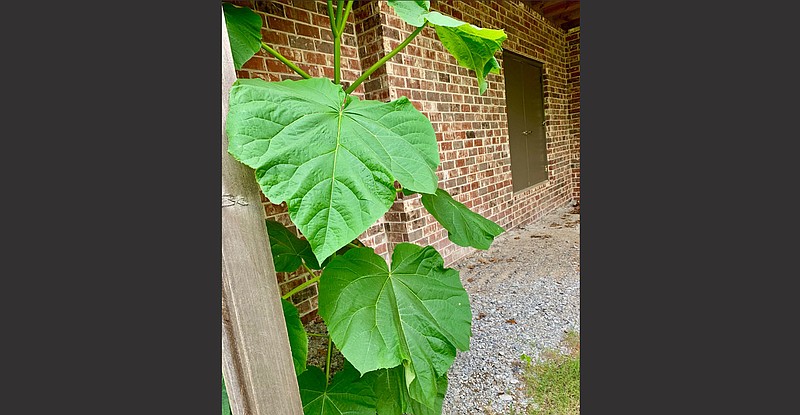Q Our daughter and family moved into a house in Bentonville. This plant is growing next to the house. We have not been able to identify it. Could you help?
A The plant is a deciduous shade tree, Paulownia tomentosa, commonly called Empress Tree or Royal Paulownia. When it is a young tree it pops up like a Jack-in-the-box and grows like a beanstalk. It's like a Jack-in-the-beanstalk, with huge leaves. As it ages, the growth rate slows down, and the leaf size gets smaller. When it is old enough, it produces large clusters of purple flowers that are followed by woody seed capsules, which open and scatter seeds hither and yon — most of which germinate, starting the process all over. While some people really love the tree, I consider it a trash tree, because of its quick rate of growth, re-seeding ability and the weakness of the wood. It cannot stay where it is growing. The mature tree will be quite large.

Q My zucchini plant has had healthy-looking leaves and yielded several healthy zucchinis but then began withering underneath and fruits became stunted. I attached pictures. Also, even more recently it developed white deposits on it. Is this disease or insects or something else?


A You do have a large plant, and I see both male and female flowers — the male blooms are the ones with just the stalk behind them; the females have small zucchinis behind the blooms. If the flowers don't get pollinated, the small fruits will wither and die. Have you seen bees? I would consider removing a few of the leaves to open the plant up just a bit. That will help with air circulation too. Sometimes small fruits will rot if there is too much moisture trapped in around them. The plant is definitely healthy enough to keep producing, so hopefully, the bees will respond and you will get some zucchini.

Q Should I remove these pods from my Alocasia?
A There is no need to remove the seed pods unless you think they are unattractive. Some of these plants do actually set viable seeds, and people try to grow more plants from the seeds. More commonly we see blooms — spathe-like structures — with no viable seeds. While I suppose some energy is going into seed production, it looks like your plant is quite healthy and doing well.
Q I have an 8-year-old fig tree, still producing well, that is getting too tall. How far back can I cut the top out without damaging the crop and when? I have to climb an 8-foot ladder now and still cannot reach some of the figs.
A Enjoy it as it is this year. Let the birds and squirrels eat what you can't reach. Prune it back as much as you want next March (after winter weather is past). We often see winter damage on existing fig trees in a cold winter. Cutting it back now will not allow for much new growth this season, and you could potentially lose more than you want during the winter months.

Q I found this fruit on my pink camellia bush today. What is it? It does not look like any type of growth.
A It is actually a seed pod or fruit of the camellia bloom. It was a nice, mild spring, with ample moisture, and many camellias set fruit. While it is possible to grow a camellia from seed, I don't have the patience to do so. It can take five to seven years for a plant to be old enough to bloom. I find it much easier to take cuttings or buy new plants. The seed capsules will be ripe when you see the pod begin to open.
Retired after 38 years with the University of Arkansas Cooperative Extension Service, Janet Carson ranks among Arkansas' best known horticulture experts. Her blog is at arkansasonline.com/planitjanet. Write to her at P.O. Box 2221, Little Rock, AR 72203 or email jcarson@arkansasonline.com
